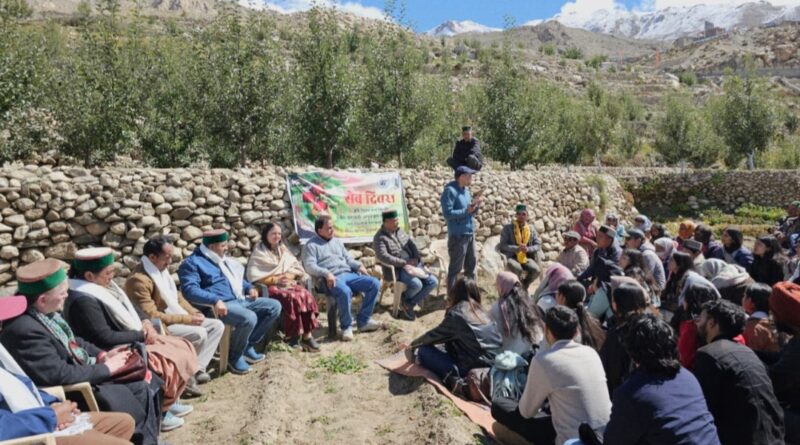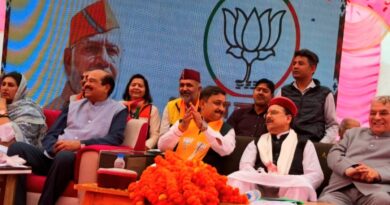High-Density Orchard Success at 12,000 ft showcased in Kinnaur
Apple Day 2.0 was celebrated with great enthusiasm at the high-altitude demonstration orchard in Malling, showcasing remarkable innovation in apple cultivation at over 3,556 meters above sea level.
The event was jointly organized by Krishi Vigyan Kendra (KVK) Kinnaur and the Regional Horticultural Research and Training Station (RHRTS), Sharbo of Dr. YS Parmar University of Horticulture and Forestry, Nauni. It highlighted the transformative potential of high-density apple planting systems and natural farming techniques designed for dry temperate regions.
Established under the Tribal Sub-Plan Project in 2021, the model orchard features ten premium apple varieties—including Super Chief, Scarlet Spur, Red Velox, Oregon Spur II, and Gala Val—grown on seedling rootstocks. The thriving orchard has become a beacon of possibility for high-altitude horticulture in India’s cold desert region.
The event was inaugurated by Padma Dorje, BDC Member, Pooh Block, who commended KVK and RHRTS for bringing advanced horticultural practices to tribal areas. Over 100 participants, including apple growers, Gram Panchayat representatives, officials from the Horticulture Department, ATMA, and BSc (Horticulture) students from the university participating in the Rural Agricultural Work Experience (RAWE) programme, attended the celebration.
Dr. Arun Kumar, Fruit Scientist and event coordinator, welcomed participants and demonstrated field-based innovations to enhance productivity in high-altitude regions. Dr. Pramod Sharma, Associate Director (Research) and Head, KVK Kinnaur, emphasized the importance of high-density planting on seedling rootstocks and adoption of natural farming for sustainable fruit production. He advocated for nature-based solutions, multi-layer cropping, and crop diversification to ensure long-term farm resilience.
Dev Raj Kaith, SMS (Horticulture), sensitized farmers about key government schemes, crop insurance, subsidies, and biological pest management. Jai Kumar from ATMA shared that more than 1,000 farmers—including 99 from Pooh Block—are part of the Natural Farming Cluster Initiative, with six villages (Nako, Chango, Ribba, Asrang, Thangi, and Kanam) already developed as model clusters.
Dr. Deepika Negi, Fruit Scientist, encouraged crop diversification within apple orchards through the inclusion of high-value crops like strawberries. Ashish Gupta, Food System Analyst, introduced the CETARA Certification System for Natural Farming produce in Himachal Pradesh, highlighting its role in promoting climate-resilient and ecological agriculture. Ajay Tannikulam, Director of Magasool Pvt. Ltd., a Bengaluru-based social enterprise working with over 1,500 farmers across India, shared insights on market linkages and value chain strengthening.
Progressive farmers Kesang Tobden from Shalkhar and Krishan Chand from Chango shared their experiences in natural farming, inspiring fellow growers with real-life success stories. Students from the RAWE programme also presented their observations, appreciating the perseverance and innovation of Kinnaur’s apple farmers.
In his valedictory address, Padma Dorje praised KVK Kinnaur’s ongoing efforts to extend scientific horticultural solutions to remote tribal areas. The event concluded with a call to farmers to adopt climate-resilient, water-efficient, and eco-friendly orchard management practices for sustainable growth.



